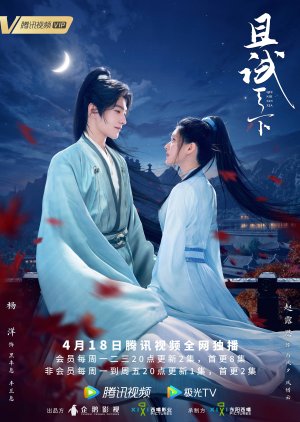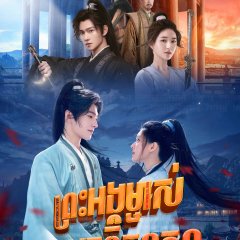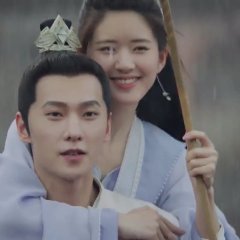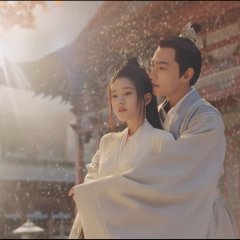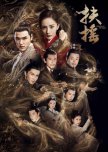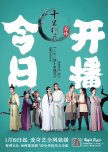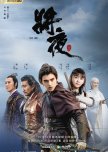 Adapting an Anime: A Sign of Affection
Adapting an Anime: A Sign of Affection Hei Feng Xi è bello ed elegante mentre Bai Feng Xi è maestosa e audace. Gli opposti si attraggono, come il bianco e nero e non hanno rivali nel mondo delle arti marziali. Attorniati dalla guerra e dal caos del mondo delle arti marziali, i fiori del loro amore iniziano a schiudersi in mezzo al sangue che è stato versato negli ultimi dieci anni. Il loro amore riuscirà a portare la pace in un mondo sconvolto dal caos? (Fonte: Inglese = ChineseDrama.info; kisskh || Traduzione = Yinying su kisskh) ~~ Tratto dal romanzo "Qie Shi Tian Xia" (且试天下) di Qing Ling Yue (倾泠月). Modifica la Traduzione
- Italiano
- Arabic
- Русский
- Ελληνικά
- Titolo Originale: 且试天下
- Conosciuto Anche Come: Qie Shi Tian Xia , Who Gets The World , 且試天下
- Sceneggiatore: Zhang Wei, Shang Meng Lu
- Regista: Yin Tao, Yu Yong Gang
- Generi: Romantico, Wuxia, Fantasy
Dove Guardare Who Rules the World
Subscription (sub)
Subscription (sub)
Subscription (sub)
Subscription (sub)
Cast & Ringraziamenti
- Yang Yang Ruolo Principale
- Zhao Lu Si Ruolo Principale
- Xuan Lu Ruolo di Supporto
- Leon Lai Ruolo di Supporto
- Zhang Hao Wei Ruolo di Supporto
Recensioni

Who rules the Drama???
Comincio col dire che la visione di questo drama da 40 puntate si é protratta per 2 intere settimane, un’eternità se la confronto al tempo che generalmente impiego per finirne uno della stessa lunghezza (5 giorni).Questo dovrebbe far comprendere quanto poco coinvolgente sia per una serie di ragioni:
La storia parla di sei regni che hanno tra l’altro nomi simili (Joungzhou,Jinzhou,Qhuinzoun,Jonzhou…) , quindi diventa confusionario capire di quale regno si tratti e quali vicende lo attraversino .
Per ognuno di questi regni, e quasi per tutte le vicende vengono rappresentate, c’é una quantità davvero sostanziosa di attori e comparse con il risultato di appesantire la visione, così lo spettatore fa fatica ad entrare nel vivo della storia perché deve farsi un quadro mentale dei 30 personaggi a cui si riferiscono gli attori quando parlano, impiega un po’ per seguire bene le vicende, si confonde e si perde. Il risultato per un drama cosi breve é che risulta molto dispersivo.
Inoltre le vicende non hanno uno sviluppo ordinato, mentre si parla di un regno si passa alla visione di un altro che non ha ancora con quello precedentemente visto delle connessioni.
Entriamo nel vivo della storia: si parla dei sei regni e della lotta per il trono che implica la conquista del mondo (da qui il titolo), nello specifico segue prevalentemente la storia del Man lead, il protagonista Fenglaxi che ha una doppia identità che verrà disvelata nel corso delle puntate senza sorpresa o stupore per nessuno se non per il padre. Questo mi é sembrato davvero inverosimile. Stessa cosa per un altro personaggio che non spoilero. Nessuna meraviglia, stupore quando si potevano usare dei colpi di scena.
La co-protagonista (su carta), la famosa Zhao Lusi ha davvero poco spazio nella vicenda, se escludiamo i primi cinque episodi, tanto che ci si chiede se il drama riguardi anche lei o se é semplicemente una figura a supporto.
Dal 20° episodio inizia ad ottenere sempre più spazio nella storia e allora ci si accorge che il lavoro comprende anche lei , fino a diventare protagonista assoluta nel corso degli ultimi episodi.
Di 50 drama finora visti é quello meno omogeneo come compresenza dei personaggi, iniziano insieme poi il FL
prende il sopravvento e il ML si eclissa sul finale, fino a diventare contorno, poi protagonisti finalmente entrambi negli ultimi cinque episodi.
La loro storia inizia come sodalizio marziale sebbene poi diventi altro ma dovrete aspettare circa 30 episodi per vedere sbocciare qualcosa, perché sono entrambi presi dal percorso di conquista e riscatto di uno, e dal supporto dell’altro, le loro vicende e peripezie sono innumerevoli, le loro sfide si risolvono nel corso dell’episodio e poi si passa alla sfida successiva, come se fosse un videogioco a livelli. Questo, personalmente, ha smorzato molta tensione perché comprendevo che tutto si sarebbe risolto presto a beneficio dei protagonisti ma ha anche interrotto il coinvolgimento presentando una discontinuità. La visione non é fluida, non ti cattura, non ti prende, non ti consente di immergerti e di immedesimarti, risultando una storiella tiepida, poco credibile, le emozioni legate alla nascita di un rapporto amoroso , fondamentale per l'evolversi della storia, sono congelate perché é un drama d’azione con pochissimo romanticismo.Gli episodi romantici sono due e tutti sul finire del lavoro, dal 30 in poi... .
Il finale non é triste ma molto , troppo uguale, a tanti drama finora visti con una brutto risvolto sul finale che lascia un retrogusto amaro. Non c’è felicita piena per il modo in cui finisce e per ciò che comporta.
Non posso spoilerare ma nonostante comprenda le intenzioni del regista sul messaggio che voglia lasciare sull’importanza del tempo speso con le persone a noi care, per le modalità con cui decide di lasciarlo, mi sembra assurdo e poco credibile che si possa godere della serenità sapendo di avere i giorni contati , con il tacito benestare della protagonista. Quanto può essere veritiero???
Quanto é credibile inoltre che questo duo che possiede un intuito e un’intelligenza fuori dal comune si renda conto dell’identità del cattivo solo a fine lavoro, quando il generale imperiale, invece, lo identifica subito e io seguendo gli indizi, da spettatore, comprendo dalla sua comparsa che é il cattivo?????
Il protagonista che è un surrogato di ingegno, intuito, furbizia e capacità oratorie, pur avendo perso la madre in giovane età, all'improvviso, non sembra porsi dei dubbi sull'eventualità che possa essere stata avvelenata, e non conduce nessuna indagine pur avendo ogni risorsa a disposizione, dato che ha costruito una sorta di organizzazione di spionaggio. Anche il re padre non ha alcun dubbio , nonostante ci fossero davvero pochi dubbi anche su chi potrebbe essere stato . Quanto è verosimile???
Ci sono poi numerosi escamotage e soluzioni che mi sono sembrate frettolosi e poco convincenti, come se la storia abbia un pubblico destinatario molto giovane , se non adolescenziale per apprezzare un lavoro cosi approssimativo.
Il caposetta marziale, custode del sigillo, doveva essere un uomo saggio, avveduto e prudente invece si rivela spesso incauto determinando una sua prematura scomparsa, in modo molto, troppo stupido.
Interpretazione : la nota dolente di questo lavoro, insieme al montaggio delle scene e a combattimenti approssimativi, non mi ha permesso di entrare nella storia ma di seguire distrattamente e controvoglia il drama. Mi riferisco a emozioni non sempre corrispondenti con quanto di tragico appariva nella storia, occhi sgranati per dare profondità al personaggio ma risultavano un po' delle caricature, il protagonista che perde i sensi in ginocchio e prima con l'avambraccio si pone in modo da non cadere di botto ma in modo comodamente studiato (se siete svenuti nella vita sapete bene che non potete sistemarvi prima in modo da evitare di farvi male). Quest'ultima scena grottesca e ridicola l'ho rivista a rallenty 5 volte perché non potevo credere che il regista non se ne fosse accorto e avesse montato proprio questa ripresa di svenimento quasi amatoriale.
Attori che stanno per morire ma hanno forza per fare discorsi e tutto ad un tratto girano la testa e chiudono gli occhi di botto. Interpretazioni PENOSE.
Salvo solo un attore che mi dispiace abbia parti da comparsa mentre meritava più spazio. Mi riferisco al fratello maggiore del protagonista maschile, il primo principe. Lui é uno dei pochi che mi ha convinto perché ha dato intensità, partecipazione, credibilità al suo ruolo, dandogli un po’ di serietà
Musiche: penso sia il drama che meno abbia investito in musiche di sottofondo e colonna sonora, il peggiore tra quelli finora visti e non mi dilungo.
Effetti speciali : alcuni combattimenti sono molto belli e di sicuro impatto scenico, molti altri sono invece cosi veloci e con soluzioni abbozzate, spesso poco curate, da avermi strappato qualche risata nel corso della visione (maniche di tessuto leggero usate come frustre, armi o scodelle lanciate nei combattimenti che vengono scagliate sulle vittime senza partire direttamente dalle mani dei combattenti, come partissero animate da una forza invisibile, peccato però che fossero a pochi millimetri dal personaggio che voleva lanciarle, spade che si piegano come fossero di carta, antichi saggi truccati male con poteri ridicoli e mosse caricaturali, sangue arancione). Eppure dovevano rappresentare la drammaticità della guerra e il sacrificio inutile dei sudditi . Occorreva più impegno.
Dialoghi: descrittivi e narrativi con poche riflessioni introspettive, salvo solo un paio di frasi (avremmo voluto sopportare il peso del cielo per te in modo evitarti ogni preoccupazione mentre quel cielo ora devi portarlo da sola). Bella anche la riflessione sulla difesa
Questo ha tolto molta serietà alla visione dello spettacolo .
PRO: le scene di guerra e le formazioni che vengono schierate per difendersi, alcuni discorsi sulle strategie militari e la concezione della difesa vista come situazione di bilanciamento, la vendetta sui cattivi, in questo lavoro finalmente ho potuto vedere piena nemesi, seppur tardiva , di tutti i cospiratori in modo sottilmente spietato, senza buonismi superflui, belli i costumi e gli interni dei palazzi, interessante utilizzo e manipolazione delle superstizioni per manipolare il popolo e i soldati. Questo è stato onestamente molto interessante da seguire.
Molto simpatica l'idea di caratterizzare la protagonista femminile come una golosona e una buona forchetta, questo aspetto mi ha intenerito e addolcito il personaggio nonostante nella vita reale penso che l'attrice , come altre, facciano i digiuni per mantenersi visibilmente sottopeso, quindi è un po' un'ipocrisia vederle ingozzarsi nei drama.
Conclusione : una storia d’azione che manca di intensità e credibilità. E non linciatemi ma Zhao Lusi non é questa grande attrice che pensavo che fosse. Certamente é più valida di tante altre, molto più belle che ancora devono, si spera, maturare artisticamente ma non é ai livelli di una Yang Zhi o Liu-Yifei.
Una cosa che mi ha fatto sorridere è come abbiano volutamente scritto i copioni a favore della protagonista, tanto da risultare palese: mai come in nessun altro drama, con protagoniste femminili molto più valide a livello estetico di Zhao Lusi, viene decantata la sua bellezza da tutti (Bella quanto letale, bella come una fata... la donna più bella del mondo... XD XD XD). Mi è sembrato un po' too much perché zhao lusi è una brava attrice ed è molto graziosa ma non è obiettivamente una bellezza sconvolgente, quindi, queste parti dove le lodi superano OBIETTIVAMENTE I REALI MERITI, le avrei tolte o quantomeno ridotte di frequenza. Mi chiedo quanto l'agenzia dell'attrice non sia coinvolta in questo .... !!!!!!!!!!
In conclusione un drama dispersivo, lento, poco convincente e forse a basso budget che aveva un progetto ambizioso che però non é riuscito a decollare ma si é perso nella lista infinita dei personaggi, delle comparse dirette male. Linee temporali confuse e sovrapposizioni un po’ a casaccio.
Chi ha dato 8 , 9 o 10 o é un fan poco obiettivo di zhao lusi o ha 13 anni!
Questa recensione ti è stata utile?

The Legend of Hei Feng-Bai Xi
Truth be told, Who Rules The World (WRTW) wasn’t on the top of my list for highly anticipated dramas for 2022. But you know what? It turned out to be one of the most entertaining dramas I’ve seen for the year. Certain characters in the show even made their way into my list of all-time favourite C-historical characters as well. I’m pleased to say that WRTW has not disappointed and in fact went beyond any initial expectation I may have had going into it.WRTW is equal parts traditional wuxia, grandiose palace politics, epic warfare and romantic love that are interwoven seamlessly to create an immersive tapestry of a vivid jianghu that transcends the boundaries of the 7 kingdoms. It revolves around the relationship between two renowned martial artists, Hei Feng Xi and Bai Feng Xi, as they navigate the treacherous world of ancient politics and pugilistic rivalries teeming with characters who are hell bent on ruling the world.
The story is based on the bestselling 2007 novel Qie Shi Tian Xia (且试天下) aka Let’s Try the World which was written by prolific period-romance novelist, Qing Ling Yue (倾泠月). The production team comprises directors Yin Tao (Love and Redemption, Ancient Love Poetry, Under the Power), Yu Yonggang (Novoland: Pearl Eclipse) as well as action director/ choreographer Shi Zhanli (The Promise of Chang’an, Under the Power, Listening Snow Tower, Love and Redemption, The Legend of White Snake). Principal photography took place at Hengdian World Studios from February to June 2021. Interestingly this drama was released concurrently on WeTV international and Netflix for global audiences.
A total of 5 songs are listed in the soundtrack of the production. Liu Yuning sings the inspiring opening theme while Lai Meiyun and Tan Wei Wei contribute moving love ballads.
无双 Unparalleled – 刘宇宁 Liu YuNing
风息 Breath Of Wind – 胡彦斌 / 叶炫清 Hu YanBin / Ye XuanQing
一梦浮生 Dreams Come True – 汪苏泷 Silence Wang
孤注 Gu Zhu – 谭维维 Tan Wei Wei
如梦 Like A Dream – 赖美云 Lai MeiYun
This production has been plagued by some controversies in that the main director was purported to have left the project about halfway through filming for reasons that were not made known publicly. Additionally certain elements of the plot, whether the screenplay or the source material itself, had been accused of plagiarism. Likewise some scenes were cited to be reminiscent of other dramas. Having not read the source material for this drama, or most other dramas for that matter, and without seeing particular shows from which their scenes had been reputedly copied, fortunately my personal viewing enjoyment was not affected by the allegations in any way.
What I Liked
The elements of wuxia, politics and warfare are beautifully crafted into a memorable tale of chivalry, heroism and love amidst an extensively conceived worldbuilding of a fictional universe. Perhaps WRTW does not reach the quality levels of Nirvana in Fire, the gold standard in this multigenre, but it certainly comes close. How often do we come across productions that attempt to cover such an extensive scope without faltering miserably or, at the very least, evoke some form of endearing connection and entertainment value?
In terms of wuxia, this is one of the best for me. The variety of martial arts prowess on display as well as depiction of the jianghu with its associated clans, sects, dark arts and, of course, the chivalric values of brotherhood, heroism, and valour are all expertly embedded into this pugilistic premise. Absolutely no complaints from me in this department.
While initially lacking and slow-moving due to the uneven pacing and multitude of character introductions, the politics of the palace and the world began to exert more control over the narrative up until the finale. This is especially so once the main players have been established and viewers are able to focus exclusively on their schemes and machinations that eventually culminate in all-out confrontations and large scale warfare among them. In some ways, the overall concept and worldbuilding remind me somewhat of Game of Thrones with the premise based on various factions fighting for supremacy and dominion over the world.
Ultimately the one aspect of the story that impresses me the most is the romance. One of the most wholesome and charming love stories that I’ve ever come across in a C-historical. It helps immensely that both leads are extremely likeable both in real life and in the depiction of their respective characters here. No silly misunderstandings, childish petulance, toxic vibes whatsoever. Just as it should be between two heroic jianghu protagonists amidst countless adorable and lovely moments indeed.
As far as the technical execution is concerned, for me the positive takeaways would be the production design which maximises the gorgeous features of Hengdian World Studios in both the opulent indoor sets and lush greenery of the outdoor shooting scenes. Cinematography, choreography and special effects are quite decent, for the most part. I’m thankful that the fight scenes in particular are presented on point without the jittery camerawork and overreliance on slow-motion, repeat cuts or fast cut editing.
The martial arts choreography is simply stunning and showcases some of the most spectacular wire-works (wire-fu) in recent memory. It might appear a bit much to some but personally I love it. Also worth mentioning is the battle scenes between large armies towards the tail end of the show. Despite being mostly CGI, the end result is reasonably rendered and, most importantly, not substituted with animation or even skipped over but is shown in its entirety.
With regards to the cast and their respective characterizations, WRTW wouldn’t be the same without the leads, Yang Yang and Zhao Lu Si. The stellar supporting cast particularly Xuan Lu, Lai Yi, Zhang Feng Yi, Lee Wai Han, Zong Feng Yan and Wang De Shun provide a memorable account of themselves in making this production work as well.
I know that Yang Yang has drawn some flak for his performances in the past but having seen him in the recently concluded Glory of the Special Forces where he delivered possibly his best work to-date, I think he deserves more credit than he’s given. The role of Hei Feng Xi / Feng Lan Xi suits him very much indeed. He has this ability to blend intensity and seriousness with warmth and tenderness as well as a dash of charm and sophistication, which adds depth to his version of the brooding, intelligent and lonely hero of this story.
The same goes for Zhao Lu Si who, despite her expertise in rom-coms, is actually quite versatile and here she showcases some range as well as a more serious side. She still has that comedic timing but as the carefree Bai Feng Xi and the more regal Feng Xi Yun, we get to experience different facets to her characters. The biggest draw in the show is obviously their romance. Whether as royalty or jianghu pugilists, the chemistry between the two absolutely sizzles to set the screen aflame. I cannot imagine anyone else embodying the roles of “Hei Feng- Bai Xi of the rivers and lakes” as well as they have done.
Amongst the supporting characters, my personal favourite include Xuan Lu’s Feng Qi Wu who shares a strong bond with Bai Feng Xi where at one point I was actually shipping them as a lovable GL pairing. It’s refreshing to observe a healthy friendship between two female characters for a change instead of the usual destructive rivalry for affections. Lai Yi’s Huang Chao is another strong character that’s worthy of mention. His connection to the leads prove intriguing where despite no love lost between them, they continue to regard one another with mutual admiration and respect.
What Fell Short
I think the transition of directors midway through production possibly caused a discernible change in the quality of direction and editing during the second half of the show. This in turn affected the flow of the storytelling because certain scenes feel somewhat disconnected while the last 8 or so episodes are a little rushed. That said, most C-historicals tend to sprint towards the finishing line with a flurry of events and activities within the final few episodes, although this could be attributed to censorship-induced post-production editing.
For obvious reasons, most of the focus is on Yong-zhou and Qing-zhou, two of the 7 kingdoms in the story. There are some highlights of Ji-zhou and You-zhou, and the initial spotlight on Dong Empire, the ruling kingdom and the seat of power itself. I would have liked to see more backstory or development in the lesser mentioned kingdoms as well as the other mysterious sects of the jianghu. At 40 episodes, it’s near impossible to fit everything and everyone, which is unfortunate as some of the minor side stories and subplots actually appear interesting and thus worth exploring.
Because of the rushed nature of the final arc, the potential for the main villain’s origins and motivations are largely glossed over in favour of the ultimate showdown. I think this dimension of the antagonist’s profile deserves at least a couple of episodes to allow the gravity of his villainy to sink in with viewers.
The FL’s identity reveal is a bit of a letdown personally for me. It should have been more sensational and shocking to everyone involved but it turned out to be a lowkey affair after all.
I feel the need to rant on one of the martial arts clans, the Tianshuang Sect. I’m not sure how they are written in the original novel or if it is meant to be a running joke but the members of that sect, along with their leader/elder/founder, are quite laughable indeed. Without spoiling, let’s just say that these folks are better off managing a zen spa or soup kitchen rather than actively attempting to partake in conspiratorial activities.
Final Thoughts
WRTW ranks amongst the better recent releases of C-historicals and wuxia productions. It hasn’t reached the gold standard that is NiF but is somewhere slightly lower, perhaps at a similar level to The Long Ballad. Objectively it’s an 8.5 but for the sheer enjoyment factor and memorable performances of the leads, I’m bumping this up to 9. This is recommended viewing for fans of the genre.
Questa recensione ti è stata utile?

